Röhnfried Courier 2019 English
You also want an ePaper? Increase the reach of your titles
YUMPU automatically turns print PDFs into web optimized ePapers that Google loves.
Carbohydrates<br />
1.<br />
Speeding up the recovery<br />
ACCELERATING REGENERATION<br />
Our first goal in the week after every competitive<br />
flight is a speedy recovery. Science provides us with<br />
the necessary insights for supporting the recovery<br />
with demand-oriented strategies.<br />
Every competitive flight is stressful. The longer the flight,<br />
the more energy is spent. Today’s well informed breeders<br />
know that carbohydrate is metabolised in the first flight<br />
phase. Then, after about an hour of flying, the fat burning<br />
process supplies the pigeons with most of the energy. In<br />
flight, protein is negligible as source of energy.<br />
Independent of whether pigeons in flight have the wind<br />
in their backs or coming from the front, immediately after<br />
the competitive flight, pigeons start building up their<br />
energy reserves. The simplest and fastest way to do that<br />
is to store carbohydrates as glycogen in the liver and muscles.<br />
!<br />
It therefore stands to reason to shorten the<br />
recovery phase by feeding carbohydrates as<br />
early as possible. The ‘fastest’ way is adding<br />
carbohydrates to the water. Feeding carbohydrate-rich<br />
grains builds up energy resources in a slightly slower process.<br />
Pigeons tend to drink plenty of water immediately<br />
after their return to the loft. Therefore, providing carbohydrates<br />
in the drinking water has the additional advantage<br />
of quickstarting the rebuilding of energy stores. We recommend<br />
adding a mix of fast and slowly metabolised<br />
carbohydrates to keep the blood sugar level balanced.<br />
In the course of longer competitive flights, increased fat<br />
burning is another factor. This involves the oxidation of<br />
free fatty acids, a process, which also leads to the formation<br />
of ketone bodies. After more than 2 hours of flight<br />
time, we therefore recommend adding the organic phosphorus<br />
supplement Butafosfan to the feed to speed up<br />
the utilisation and clearance of metabolic side products.<br />
For many years now, Butafosfan has been fed to working<br />
animals to lighten the stress on the liver and to accelerate<br />
the recovery after physical stress. Especially in cases of<br />
medium and intense exhaustion, the pigeons recover fast<br />
and quickly regain their physical strength.<br />
Antioxidative vitamin C can not only help to replenish depleted<br />
glycogen stores on a cellular level, but it can also<br />
strengthen the body’s own defence system and accelerate<br />
the regeneration process.<br />
Moreover it supports iron absorption in the gastro-intestinal<br />
tract and is a part of the body’s own hormonal synthesis.<br />
Additionally, this valuable vitamin also participates<br />
indirectly in the fat burning process in the muscular system.<br />
That is why we recommend to supplement vitamin C<br />
immediately after the race.<br />
10 <strong>Courier</strong> <strong>2019</strong>















